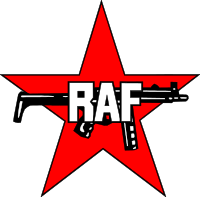
Back Rote Armee Fraktion Afrikaans Rote Armee Fraktion ALS جماعة الجيش الأحمر Arabic Qırmızı Ordu Fraksiyası Azerbaijani Фракцыя Чырвонай Арміі Byelorussian Фракция Червена армия Bulgarian Tuad an Arme Ruz Breton Frakcija Crvene armije BS Fracció de l'Exèrcit Roig Catalan Frakce Rudé armády Czech
| Red Army Faction | |
|---|---|
| Rote Armee Fraktion | |
 Later design of the RAF's insignia showing a red star and a Heckler & Koch MP5 submachine gun | |
| Founder | |
| Dates of operation |
|
| Active regions |
|
| Ideology | |
| Political position | Far-left |
| Allies | |
| Opponents |
|
| Battles and wars | |
| Designated as a terrorist group by | |
The Red Army Faction (RAF, German: [ɛʁʔaːˈʔɛf] ; German: Rote Armee Fraktion, pronounced [ˌʁoː.tə aʁˈmeː fʁakˌt͡si̯oːn] ),[a] also known as the Baader–Meinhof Group or Baader–Meinhof Gang (German: Baader-Meinhof-Gruppe, Baader-Meinhof-Bande, German: [ˈbaːdɐ ˈmaɪ̯nˌhɔf ˈɡʁʊpə] ), was a West German far-left militant group founded in 1970 and active until 1998. The RAF described itself as a communist and anti-imperialist urban guerrilla group. It was engaged in armed resistance against what it considered a fascist state. Members of the RAF generally used the Marxist–Leninist term faction when they wrote in English.[3] Early leadership included Andreas Baader, Ulrike Meinhof, Gudrun Ensslin, and Horst Mahler. The West German government considered the RAF a terrorist organization.[b]
The RAF engaged in a series of bombings, assassinations, kidnappings, bank robberies, and shootouts with police over the course of three decades. Its activities peaked in late 1977, which led to a national crisis that became known as the "German Autumn". The RAF has been held responsible for 34 deaths, including industrialist Hanns Martin Schleyer, the Dresdner Bank head Jürgen Ponto, federal prosecutor Siegfried Buback, police officers, American servicemen stationed in Germany,[4] as well as many cases of collateral damage, such as chauffeurs and bodyguards, with many others injured throughout its almost thirty years of activity; 26 RAF members or supporters were killed.[4] Although better-known, the RAF conducted fewer attacks than the Revolutionary Cells, which is held responsible for 296 bomb attacks, arson and other attacks between 1973 and 1995.[5] The group was motivated by leftist political concerns and the perceived failure of their parents' generation to confront Germany's Nazi past,[4] and received support from Stasi and other Eastern Bloc security services.[6][dubious ]
Sometimes, the group is talked about in terms of generations:
- the "first generation", which consisted of Baader, Ensslin, Meinhof and others;
- the "second generation", after the majority of the first generation was arrested in 1972; and
- the "third generation", which existed in the 1980s and 1990s up to 1998, after the first generation died in Stammheim maximum security prison in 1977.
On 20 April 1998, an eight-page typewritten letter in German was faxed to the Reuters news agency, signed "RAF" with the submachine-gun red star, declaring that the group had dissolved.[7] In 1999, after a robbery in Duisburg, evidence pointing to Ernst-Volker Staub and Daniela Klette was found, causing an official investigation into a re-founding.[8]
- ^ Dapprich, Matthias (2013). The historical development of West Germany's new left from a politico-theoretical perspective with particular emphasis on the Marxistische Gruppe and Maoist KGruppen. Books on Demand GmbH. p. 49. ISBN 9783746098456.
The legitimacy of violent and political resistance was also stressed by Mao Zedong, who was widely cited by the RAF in its first public statements. In contrast to the violent resistance of terrorist factions, political Maoists stressed the importance of political resistance to the bourgeois society.
- ^ McDevitt, Matthew (2019). Gewalt und Gedächtnis: An Examination of Gerhard Richter's 18. Oktober 1977 in Relation to the West German Mass Media. Trinity College Digital Repository. p. 20.
Acting on Carlos Marighella's influential Minimanual of the Urban Guerilla and the Maoist tenet that bringing the armed struggle from the fringes of society to the center of the metropole is the necessary precondition for meaningfully altering the superstructure, the RAF attempted to aggravate the Federal Republic into overreacting, thus exposing the unrelenting and unsympathetic mechanisms of the state.
- ^ Wagner, Rolf Clemens (13 May 1998). "'We Are Not Political Idiots!': Thoughts On The End Of The Red Army Fraction (RAF)". Jungle World. Archived from the original on 5 August 2011 – via Hartford Web Publishing.
- ^ a b c Connolly, Kate (24 September 2008). "Terrorist chic or debunking of a myth? Baader Meinhof film splits Germany". The Guardian. Retrieved 11 June 2021.
- ^ IM.NRW.de Archived 2 December 2008 at the Wayback Machine, Innenministerium Nordrhein-Westfalen: Revolutionäre Zellen und Rote Zora.
- ^ Cite error: The named reference
:2was invoked but never defined (see the help page). - ^ "RAF-Auflösungserklärung" (in German). Archived from the original on 17 October 2007. Retrieved 24 February 2009.
- ^ Verfassungsschutzbericht Nordrhein-Westfalen 2001: "Rote Armee Fraktion", 2001, pp. 42 ff. (Archived 14 September 2004 at the Wayback Machine)
Cite error: There are <ref group=lower-alpha> tags or {{efn}} templates on this page, but the references will not show without a {{reflist|group=lower-alpha}} template or {{notelist}} template (see the help page).
© MMXXIII Rich X Search. We shall prevail. All rights reserved. Rich X Search